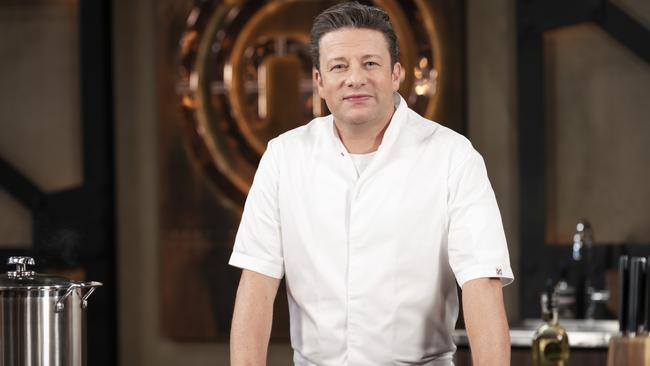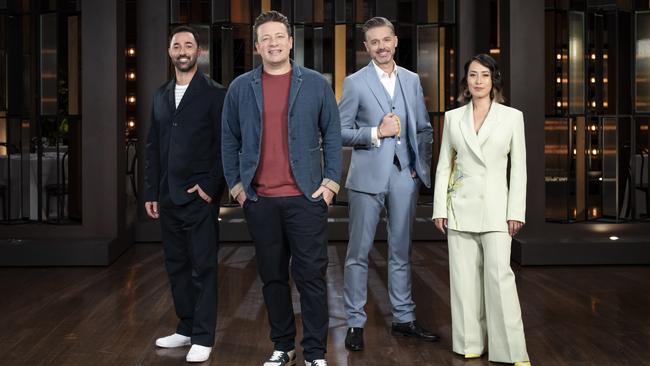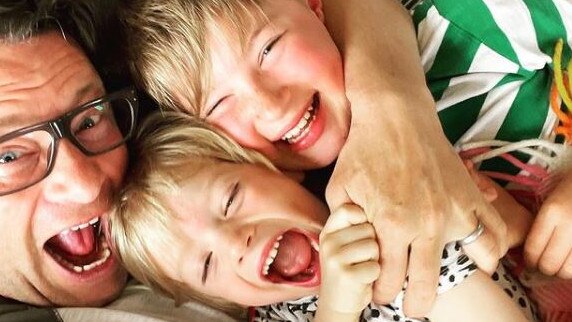Jamie Oliver makes quick trip to Australia for MasterChef, reveals huge personal loss during Covid
While making a top-secret dash to Australia for the new season of MasterChef, Jamie Oliver revealed how his community spirit during Covid cost him dearly.

TV
Don't miss out on the headlines from TV. Followed categories will be added to My News.
Jamie Oliver paid a hefty price for doing his bit to keep people entertained and well-fed during the pandemic.
The amiable chef, together with his wife Jools and their five children, filmed his latest “chop and chat” series Keep Cooking and Carry On from their Essex farmhouse during lockdown to inspire people with ideas for cooking wholesome meals using pantry staples.
Oliver saw the lockdown show – which was filmed at his own cost and with his wife Jools filming much of it on his iPhone – as a community service to bring comfort to viewers at a stressful time.
“And in doing that, sadly, I lost all of my pictures and videos of the last 17 years of my life,” he says after explaining that his files were somehow deleted while transferring the digital footage of the program to editors for broadcast.
“So, there was a price to pay and that was probably losing [all the pictures and videos of] the birth of all my children.”
Oliver says his attempts to retrieve the lost memories have been completely futile.
“Once it’s gone its gone,” he sighs.
“I have mates who work really senior at Apple, and I have spoken to engineers and there is no bubble, no safety net, no outer rim. I kept saying: ‘there must be something! There must be something!’
“But sadly, throughout that process, everything is gone. So, I guess the moral of the story is, stop filming your children and live in the moment.”

Oliver had the opportunity to make some new memories in November when he made a covert dash to Australia to film a surprise cameo in the opening two episodes of the latest season of MasterChef.
In town for just a weekend, Oliver squeezed in a quick visit with his old mates Tobie Puttock and Matt Skinner.
Puttock and Oliver have been mates since 1999 when they worked together at London’s River Café. Puttock is godfather to Oliver’s second child, Daisy Boo. And Oliver is godfather to Puttock’s daughter, Birdie.
“It was great to see my little goddaughter Birdie,” Oliver says.
“I only got to do some basic stuff [on the visit] I am going to come back [to Australia this year] for our work. This trip [for MasterChef] was just a little added extra before Christmas to get the tastebuds going after two years of lockdown.”
Nobody apart from Puttock, Skinner and those on the MasterChef set knew that Oliver had been in town.
“I had to be very secret about it and not tell anyone,” he laughs.
“I was under strict instructions. It worked out that I could do it over a weekend.
“So yeah, they’ve kicked off the new season, which is really, really exciting. I’m so pleased to be a part of it. Yeah, we’ve got some amazing contestants. It’s going to be a good year for sure.”
To counteract the inevitable jet lag, Oliver stayed up even later than normal – working until 3am – before boarding his plane to Australia.
“It was very tactical, very strategic,” he says.
“And it appears to have worked because I am towards the end of my second day, and I haven’t felt too terrible. So, I think I pulled it off.”

Oliver was greeted with a rock star welcome when he strolled into the MasterChef kitchen to cheers and tears from the starstruck contestants.
“It was pretty emotional actually – they went ballistic,” he chuckles of his entrance.
“And the only thing to do when you walk into that place is to give everyone a massive hug, which I did.”
The experience was especially meaningful for the tactile chef coming on the back of the pandemic.
“I’ve always been about food being something that brings people together and it’s very hard to truly communicate food without touch,” he reflects.
“We all learned that – along with many other things – that touch was something we were stopped from doing. Look cookbooks are great. TV is great. But to be in the presence of people to try and empower them with the confidence to develop their cooking skills and be able to touch, show and pick-up is what MasterChef is all about.”
It is the first time that Oliver has appeared on the Australian cooking juggernaut in a decade. But he has remained a fan throughout its run.
“The MasterChef show in the UK is nothing like the Aussie one because over a nice period of time you get true transformations of people through the challenges,” he explains.

What sets MasterChef Australia apart, Oliver says, is that the challenges don’t just make for great TV, they change lives.
“The proof is in the pudding, right?” he says, smiling knowingly at his food pun.
“If you look at the alumni, nearly all of them have completely changed their lives since being on it whether it’s within the food industry or the successful stories that they have in their own right. They’ve all gone on to use it to make them thrive. I think that that’s pretty rare in a TV show, I have to be honest.
“You guys are doing it right; we have to catch up.”
The celebrity chef set the first challenge of the season, giving the contestants 90 minutes to cook him their secret weapon.
Oliver smiles that the task was open to interpretation. While for some it meant presenting a signature recipe that they have cooked a thousand times before, for others it meant showcasing a special skill or technique.
One contestant – whose family hails from both Russia and Ukraine, Ukrainian – wowed Jamie with her grandmother’s recipe for borscht. Upon tasting the traditional soup and hearing her story, Oliver revealed that he had been secretly sheltering two Ukrainian families at his Essex home since the Russian invasion.

Asked what his own secret weapon would be, the unabashed lover of Italian cuisine smiles that there is nothing better than a simple bowl of pasta.
“But my secret weapon in life is not being afraid to fail,” he says.
“Embracing failure and moving on and evolving and adapting.
“I think if you look back at my career, I’ve been pretty open and honest about the failures as well as successes. And I don’t think people really talk about that enough.
“People are under the illusion that professionals get it right all the time … but it’s basically just a long line of attempting and pulling things off or pulling them off less well or failing.
“I think failure is a currency that probably hasn’t had enough respect in the last few decades, in my opinion.”




